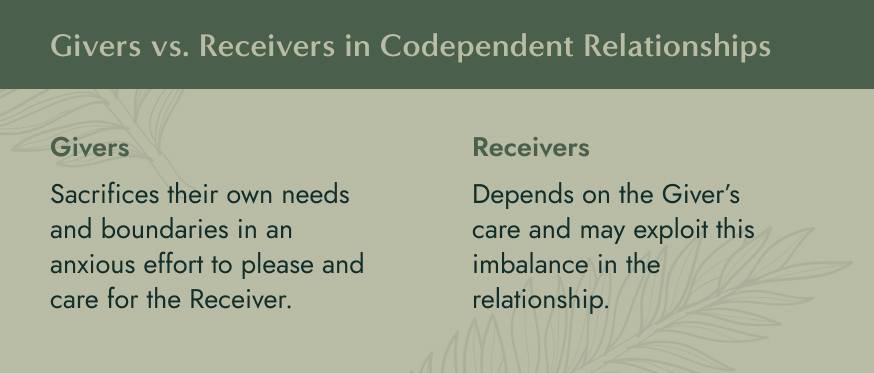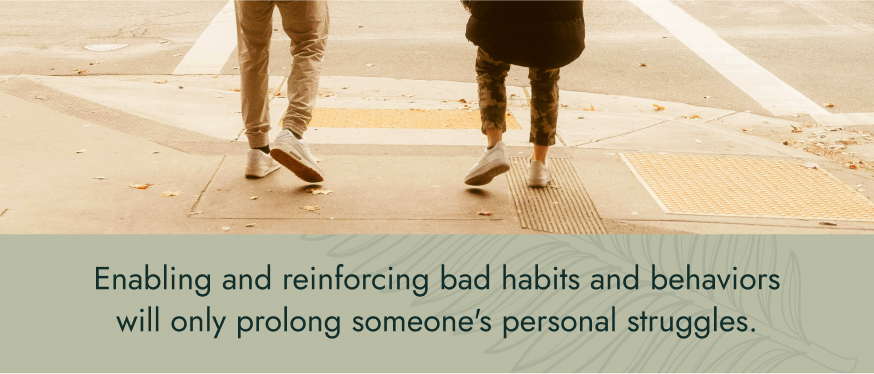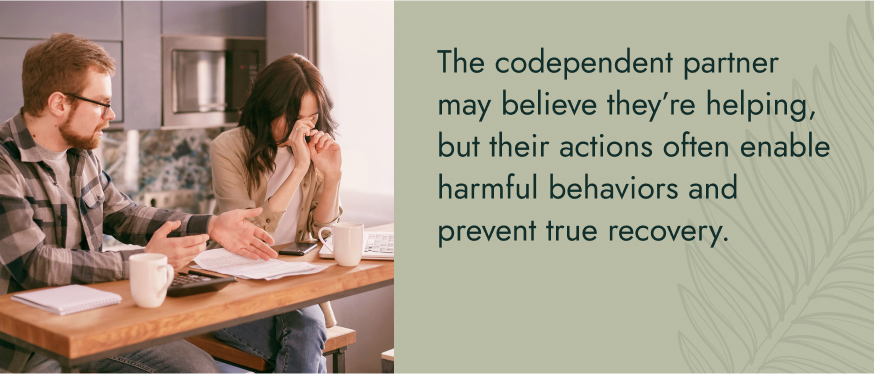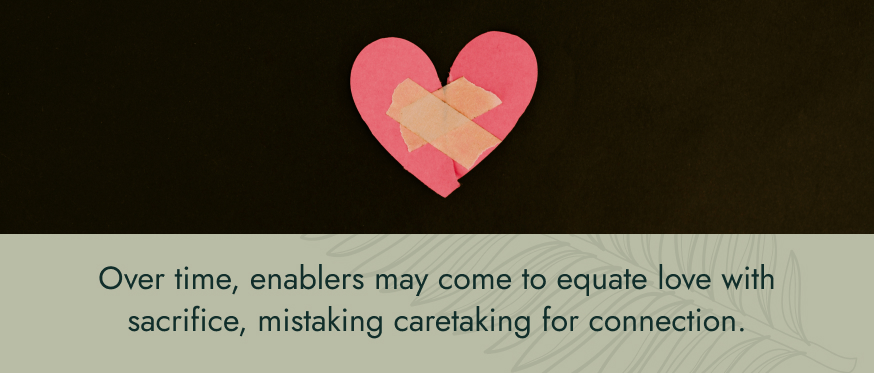Codependency vs. Enabling


Codependency and enablement are two different things. However, they can often go hand-in-hand. Get to know the common signs of the two and ways to avoid a codependent or enabling relationship.
What Is Codependency?
The term ‘codependency’ refers to the emotional and physical reliance a person forms on another person. It can be found in familial, friendly, or romantic relationships. In codependent relationships, the reliance dynamic causes a harmful and unbalanced interaction between the individuals.
A codependent person may neglect their own wants and needs by placing more attention and effort on those of the other person. By not establishing healthy boundaries and expectations, one person often ends up giving far more than they receive in the relationship.

Learn Healthy Relationship Behaviors in at Sequoia
Sequoia Behavioral Health is here to help you resolve your codependent and enabling behaviors. We'll help you understand the causes of your codependency issues and how to create healthier relationship patterns.

The Giver and Receiver Roles in Codependent Relationships
Thus, one person assumes the role of the ‘Giver’ and the other the ‘Receiver.’ This can result in an abusive relationship, because the individual being depended upon may feel that they can get away with almost anything.
The underlying dynamic between the two people can become deeply grounded in fear. The Giver’’ over-earnestness to please often sets unrealistic and/or unhealthy expectations for their future actions. In this way, they trap themselves in a cycle of needing to compete or keep up with their own established standards and fear of consequences that may occur if they do not perform as usual.
Read our related guide for more information on codependency.
Codependency vs. Dependency
Humans are social creatures. We rely on each other on both a local and global level to survive and thrive. In a healthy relationship, two people rely on each other for various needs. So long as there is balance and reciprocity, the relationship can be mutually beneficial. This mutuality in an interdependent relationship is what creates value and support in the relationship for both parties.
A codependent relationship, on the other hand, is unbalanced, under-reciprocated, and creates over-dependence. A ‘Giver’ will sacrifice confidence, self-care, and ambition to an unhealthy degree for the other person.
Read our related article to discover the similarities and differences between codependency vs. dependency.
What Is Enablement?
Enabling behavior, in simplest terms, is doing something for a loved one that they should be doing for themselves. Enablement typically starts as an effort to show support and care to someone while they are having a hard time. However, this support is done in a way that promotes unhealthy habits and behaviors.
Some relationships have both enablement and codependency dynamics at play. This might look like a person who puts their own wants and needs aside to help a person struggling with addiction, but the type of help they offer only allows the person to continue their habit with fewer consequences. The situation can quickly become out of control, especially when substance abuse is a factor in the relationship.
Helping vs. Enabling
When a loved one develops a serious problem, it is typically our first instinct to help them in the best ways we know how. However, It can be tricky to differentiate when we are helping a loved one or supporting poor behavior.
Truly helping someone is pulling them from the clutches of substance abuse, mental illness, abusive tendencies, etc. Enabling and reinforcing bad habits and behaviors will only prolong their personal struggles.

What Codependency Looks Like
Codependency is commonly referred to as “relationship addiction”. It is a behavioral and emotional condition that prevents a functional, healthy relationship from developing.
A codependent person can oftentimes find themselves in dangerous circumstances due to their desperate need for approval from another. It is important to recognize warning signs of a codependent relationship, and take proactive steps to stop it from continuing.
Signs of Codependency
Codependency is expressed in a variety of ways. At times, people do not fully recognize the severity of their codependency or that it is even occurring at all. This is because a person may have had a long line of codependent relationships, or be so deep in the dysfunction that they do not recognize the state of the relationship.
Common signs of a codependent relationship include:
- Not following through with expectations and boundaries
- Prioritizing a loved one’s well-being over your own
- Disregarding ‘gut instincts’
- Feeling lost or insecure without the other person
- Denying problems in the relationship
- Turning to drugs or alcohol to deal with the stress and dysfunction of the relationship
- Feeling responsible for the other person’s thoughts, actions, and feelings
Recognizing these signs is the first step toward breaking unhealthy patterns and building more balanced, fulfilling relationships.
Causes of Codependency
Codependent relationships can occur at any point in one’s life and in any type of relationship dynamic. Nonetheless, it is typically rooted in negative childhood experiences. A childhood surrounded by a dysfunctional family may experience a variety of codependency problems in adulthood.
There are two extreme experiences most often linked to codependency:
- Overprotective parenting and coddling
- Repeatedly ignored pain, shame, or fear
These behaviors are typically passed down, generation to generation. They are learned behaviors that follow unhealthy coping mechanisms. Codependent individuals often do not openly discuss their issues because they don’t want to ‘burden’ their loved ones. Without confrontation of these issues, the cycle of codependency and struggle typically continues for far too long.
Impacts of Codependency
When one person in a relationship is struggling with addiction, codependency can create a cycle that sustains the dysfunction. The codependent partner may believe they’re helping, but their actions often enable harmful behaviors and prevent true recovery for both individuals.
Codependency can have several negative impacts, including:
- Reinforcing the addiction by covering up consequences or managing responsibilities for the addicted person
- Neglecting personal well-being as the codependent partner prioritizes the other’s needs over their own
- Living in constant emotional distress, with heightened anxiety, fear of failure, or fear of abandonment
- Operating from guilt, believing the addiction is their fault or that they must “fix” the problem
- Struggling to set healthy boundaries, which can delay or derail the recovery process for both people
Recognizing these patterns is important not only for supporting a loved one’s recovery, but for beginning your own healing as well.
Related Blogs

How To Stop Being Codependent
Codependency causes you to lose your sense of self in relationships. With the right amount of self-awareness, therapy, and support, you can regain your identity and form healthy relationships.

Avoidance Coping: What It Is and How to Stop It
Avoidance coping is a negative coping strategy that causes anxiety by pushing problems away rather than dealing with them.

Navigating Toxic Relationships In Recovery and After
Toxic relationships can harm the treatment process and should be navigated or cut out. Here are some tips on how to do that.

What Enabling Looks Like
Though you may feel like you are being helpful to a loved one, it is all too easy to become a ‘crutch’ for them that aids in their addiction.
Signs of Enablement
Some common signs of enablement include:
- Protecting a person from the consequences of addiction by covering for them or telling lies to prevent them from inevitable consequences
- Keeping secrets about poor behavior, abuse, or addiction and failing to alert other loved ones of a serious problem in effort to avoid drawing attention to the matter
- Making excuses for a loved one. For example, a person may call in sick to work or school for the other person when they are actually hungover
- Taking on responsibilities for the other person—such as cleaning or child care—when the addicted individual is failing at fulfilling their daily duties
- Providing financial assistance such as giving money that will be used to support reckless, harmful, impulsive, or lazy behavior
When we think of enablement, we typically think of it in terms of substance abuse. Enablement, however, can mean supporting an array of other addictive or compulsive behaviors such as gambling, shopping, eating, hoarding, etc.
Causes of Enablement
Enablement often develops alongside codependency but stems from a distinct set of emotional experiences and beliefs. While it may appear as compassion or loyalty on the surface, enabling behavior frequently arises from deep-rooted fears and unresolved emotional patterns.
Some of the most common causes of enabling include:
- Fear of conflict or abandonment
- Guilt over a loved one’s struggles or past experiences
- Desire to maintain peace, even at personal cost
- Belief that helping someone means shielding them from consequences
Like codependency, enablement is often learned in childhood—especially in environments where problems were hidden, consequences were avoided, or emotional expression was discouraged. Over time, enablers may come to equate love with sacrifice, mistaking caretaking for connection.

Impacts of Enablement
For the person struggling with addiction, being enabled can significantly delay recovery. When consequences are softened or avoided, there’s little motivation to change. Over time, this safety net prevents them from developing independence, accountability, or the resilience needed to maintain sobriety.
For the enabler, the emotional and mental toll is heavy. Constantly managing crises, finances, and emotional fallout can lead to exhaustion, anxiety, and financial strain. Even with the best intentions, the enabler often loses themselves in the process and feels responsible for someone else’s choices, all while their own needs go unmet.
Breaking the Cycles of Enabling and Codependency
Enablement and codependency are sure signs that both individuals in the relationship need help. Either of these two unhealthy relationship dynamics can lead to obsessive behavior, unrealistic expectations, and even addiction. Even if these behaviors have been present for a long time, the cycles can be broken.
Read our related guide to discover what to expect from family therapy.
How to Stop Enabling and Codependency
Whether you recognize signs of enablement, codependency, or both in any of your relationships, it is important to seek out help. By taking a step back from the relationship and involving a professional, you are welcoming the help and support needed for you and your loved one to recover.
At Sequoia, you’ll be seen, listened to, and welcomed into a community that understands exactly what you are going through. We’ll work with you and your loved ones to answer your questions and make sure you understand your path forward.
Contact us today so we can help start you on a journey to reclaiming healthy relationships.
Learn More
Attachment Style Therapy
Attachment style therapy helps people heal from past experiences and develop secure attachments in all of their relationships.
Grief Therapy
Through a supportive and compassionate approach, grief therapy provides guidance and tools for grief management.
Trauma Therapy
Trauma-informed therapy recognizes that trauma is an underlying part of many other conditions, helping us provide compassionate and effective treatment.
Your family history and dynamics can have a huge effect on your mental health and your recovery. Learn how Sequoia deals with family therapy, and what you can expect from it.


